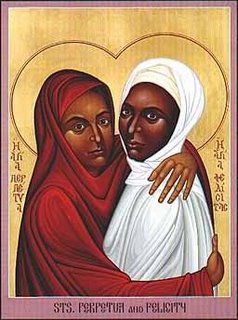Sts. Perpetua and Felicity - c. 203
 Before her death, St. Perpetua wrote an account of her sufferings, which we still have today. Obviously, someone else stepped up and finished the story after her death, but nevertheless, her autobiographical description is one of the first documents we have written by a woman--making St. Perpetua one of the first female writers! Her story was so popular, in fact, that St. Augustine had to warn his parishioners against giving it the weight of Scripture!
Before her death, St. Perpetua wrote an account of her sufferings, which we still have today. Obviously, someone else stepped up and finished the story after her death, but nevertheless, her autobiographical description is one of the first documents we have written by a woman--making St. Perpetua one of the first female writers! Her story was so popular, in fact, that St. Augustine had to warn his parishioners against giving it the weight of Scripture!St. Perpetua was born around AD 181, in Carthage, a city of North Africa. She was the daughter of a wealthy Roman nobleman, and was married to a soldier. At that time in the Roman Empire, slavery was still a common and acceptable practice, and being a rich noblewoman, Perpetua had slaves. One of them was Felicity. But because they were of similar ages, and had both recently been married, and since Perpetua had just given birth, and Felicity was pregnant, the similar events in their lives led them to develop a friendship that went beyond slave-master.
At this time, in the Roman Empire, the Emperor, Caesar Septimus Severus had proclaimed that Christianity was illegal, and that it was therefore illegal to convert to Christianity, or to proclaim and teach the Christian faith to non-Christians. Those who were already Christians, or born into Christian families, were excluded from the government's censure, unless they tried to convert others--but for those who converted, the penalty was often death. Despite this, the Christians continued to spread the Gospel, convinced of its truth and importance. That was how St. Felicity's husband came to hear about Jesus, and he began learning about the Christian faith from a priest, Father Saturus. Felicity's husband, Revocatus, convinced Felicity to come and learn as well, and she in turn persuaded Perpetua.
These three, with two others (Saturninus and Secundulus), attended catechism in secret from Father Saturus. However, before they could complete their instruction, and be baptised the following Easter, the Roman government found out about their religious instruction, and had the five catechumens, as well as their priest, arrested. The date for their trial would not come right away, though, and they languished in their dungeon for months--awaiting a suitable occasion: the birthday of the Emperor!
During their time in prison, Fr. Saturus would continue to teach them the Christian faith, and, when they were catechised enough, he took some of their drinking water, and baptised each of them, since it would be impossible for them to wait for the following Easter. During this time, Perpetua's father, who was a nobleman and thus had influence, was permitted to visit Perpetua. But far from bringing joy and relief to her, she writes that his visits only served to vex her further, since he, as a Pagan Roman, continually tried to convince Perpetua to abandon the Christian faith to save her life. He appealed to her reason, to her honour and to her family's honour--to not die so shameful a death. But most of all, he appealed to her mother's heart, for who would take care of her newborn baby? Perpetua knew that her son would be starving without her to feed him, since he hadn't been weaned yet. But on one of her father's visits, he brought her mother and also her brothers, one of whom himself was also secretly learning the Christian faith (though, obviously, he hadn't been caught yet), and he went to the Deacons of the Church in Carthage, who bribed the guards to let Perpetua's baby be brought to her. And so she was able to feed her son until her trial.
Furthermore, Perpetua's brother also asked her to pray to God, that maybe she'd be granted a vision that would indicate whether her current sufferings and imprisonment would lead to martyrdom. She agreed, and in fact did receive a vision. Here's her account:
I beheld a ladder of bronze, marvelously great, reaching up to heaven; and it was narrow, so that not more than one might go up at one time. And in the sides of the ladder were planted all manner of things of iron. There were swords there, spears, hooks, and knives; so that if any that went up took not good heed or looked not upward, he would be torn and his flesh cling to the iron. And there was right at the ladder's foot a serpent lying, marvelously great, which lay in wait for those that would go up, and frightened them that they might not go up. Now Saturus went up first (who afterwards had of his own free will given up himself for our -sakes, because it was he who had edified us; and when we were taken he had not been there). And he came to the ladder's head; and he turned and said: Perpetua, I await you; but see that serpent bite you not. And I said: it shall not hurt me, in the name of Jesus Christ. And from beneath the ladder, as though it feared me, it softly put forth its head; and as though I trod on the first step I trod on its head. And I went up, and I saw a very great space of garden, and in the midst a man sitting, white-headed, in shepherd's clothing, tall milking his sheep; and standing around in white were many thousands. And he raised his head and beheld me and said to me: Welcome, child. And he cried to me, and from the curd he had from the milk he gave me as it were a morsel; and I took it with joined hands and ate it up; and all that stood around said, Amen. And at the sound of that word I awoke, yet eating I know not what of sweet.(Meaning, of course, that they placed all their hope in Heaven, not that they gave in to despair.)
And at once I told my brother, and we knew it should be a passion; and we began to have no hope any longer in this world.
The six Christians continued to pray with each other and encourage each other as the day approached, but St. Felicity grew more and more worried. You see, she was still pregnant, and was not due to give birth until after the date slated for execution. According to Roman law, a pregnant woman could not be tortured or executed until after she had given birth. St. Felicity was worried not so much about being tortured or executed for Christ's sake, but that she would not be able to be martyred along with her friends. It's often hard to do the right thing. That's especially the case when it comes to giving your life. But it's even harder when you have to do it alone. Felicity was worried that when her time came, without her friends' encouragement she would not find the strength within her to confess Christ.
The six prayed together about this, and although Felicity was only about eight months pregnant, a week before their trial, she gave birth to a healthy baby, who was arranged to be adopted by a Christian family. In this, God showed that He was still with them, and cared for them, even in that dark prison. His asking of them to lay down their lives was not a sign that God had abandoned these six brave Christians, but rather, that He had singled them out for greater honour!
The day before their martyrdom, the six were allowed to have whatever they desired as a "last meal". Unanimously, they chose to have bread and wine, which Fr. Saturus blessed, and so they celebrated the Mass together. When the day finally came for these six great saints to be martyred, they were led to the arena in Carthage, to be tried by the magistrate. Each in their turn were asked whether they would renounce Christ and sacrifice a goat to Caesar and worship him, and each in their turn refused, claimed to be Christian, and were sentenced to be thrown to the wild beasts.
When it came time for Perpetua to be tried, however, not only the magistrate, but also her own father, attempted to convince her to abandon the Church. Her father came forward, carrying her baby in his arms, and appealed again to Perpetua to recant and live, so that her baby wouldn't die of starvation, for lack of milk. But again, through God's grace, He made it so that the baby was already weaned before his time, and no longer needed his mother to live. Thus, Perpetua, with her friends, professed herself a Christian, and was sentenced to death.
While the men were sentenced to face off against leopards and bears, out of spite and mockery for their femininity, the court sentenced Perpetua and Felicity to be attacked by a cow (a symbol of motherhood, and a mockery of these two mothers). When the two courageous women were thrown into the arena, Perpetua's robe tore, and she took the time to tie it so that she would appear modest and decent, taking more care for her modesty than for her own wounds. She even tied back her hair, since messy, unkempt hair was a sign of mourning in her culture, and she didn't want anyone to think that she was sad at her fate, but courageous and confident in God. She turned to help up Felicity, and immediately was led off to the side of the arena to rejoin the men who had survived the beasts. When there, she asked them, "When are we going to face the cow?" Amazed, her friends said to her, "You already have! It's hurt you! Look at yourself!" Perpetua and Felicity had been blessed by God to have had an ecstatic encounter with him, so that they were spared the pain of the cow's attack. In fact, Perpetua had to be shown her own wounds before she would believe her friends!
Afterward, all of them were led out again, and sentenced to be killed by the sword. The courage of these martyrs, particularly of the women, touched the audience so much, that many of them became Christians, including the jailer of the martyrs. It was one of these converts who finished the account of Perpetua's and Felicity's martyrdom, so that others in future generations would hear about and be inspired by their courage and sacrifice. In the author's own words:
O most valiant and blessed martyrs! O truly called and elected unto the glory of Our Lord Jesus Christ! Which glory he that magnifies, honors and adores, ought to read these witnesses likewise, as being no less than the old, unto the Church's edification; that these new wonders also may testify that one and the same Holy Spirit works ever until now, and with Him God the Father Almighty, and His Son Jesus Christ Our Lord, to Whom is glory and power unending for ever and ever. Amen.God bless.
Labels: Faith, Hope, Love, Martyrs, Saints, St. Andrew's, Virtue



